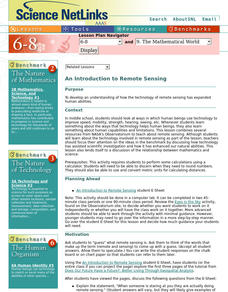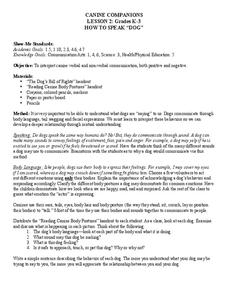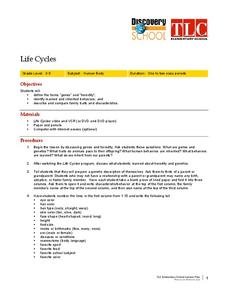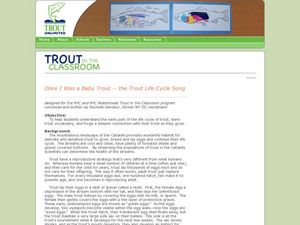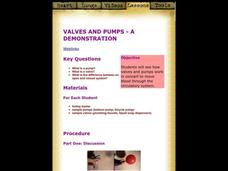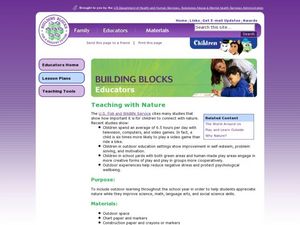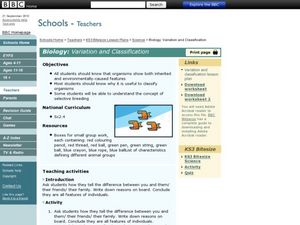Curated OER
Sampling Rocks
Learners study rocks they find on the playground. In this investigative lesson students collect and analyze rocks they find and answer questions about them.
Curated OER
Beaver Ecology
Students explore the lives of bgeahvers. They identify the physical and behavioral adaptations that help beavers survive in their environment. Students compare and contrast how beavers influence the ecology of both forest and aquatic...
Curated OER
Epidemic, Plague, and Infection
Students investigate the illness borne in concentration camps. In this Holocaust lesson, students participate in a simulation that requires them to consider how ailments became epidemics in concentration camps.
Curated OER
Observations and Inferences
Students observe how to distinguish observations form inferences. In this examining inferences lesson students list observations relating to the activity and discuss the importance of them.
Curated OER
Canine Companions
Learners interpret canine verbal and non-verbal communication. In this dog communication lesson, students discuss dog communication through bark and body language. Learners study the 'reading canine body postures' worksheet and write...
Curated OER
World of Protists
Students observe a jar of pond water and predict how much life they think exists in the jar and watch a "Bill Nye: The Science Guy" video regarding protists. They participate in an online virtual pond dip where they begin to familiarize...
Curated OER
Life Cycles
Students identify inherited traits. In this heredity instructional activity, students watch a video and construct a genetic description of themselves.
Curated OER
Once I Was a Baby Trout
Students sing a song about the trout life cycle. In this trout life cycle lesson plan, students learn trout vocabulary and make motions while singing this song.
Curated OER
Valves and Pumps - A Demonstration
Learners see how valves and pumps work in concert to move blood through the circulatory system.
Curated OER
Making Soap
Students recognize and use chemical indicators in the lab, recognize the need for safety while doing chemical experiments and understand the need for following precise directions.
Curated OER
IDENTIFYING PARTS OF THE BODY
Learners identify and describe the various parts of the body therefore, practicing English vocabulary, pronunciation, and spelling. They discuss the various body parts, some of the inner organs and also, their functions. Finally,...
Curated OER
Scales, Scutes, and Skins
Students identify the various adaptations of reptiles and amphibians. After distinguishing between reptiles and amphibians, students discuss the ways in which their adaptations aid in their survival. They participate in a hands on...
Curated OER
Adaptations
Young scholars identify what adaptation is and to research a specific mollusk. They also identify and interpret how animals get their common and scientific name and why it is Latin. Finally, students draw their shell (mollusk) and name...
Curated OER
The Aerial Age
Students infer America's attitude towards aviation in the early 1900s. In this The Aerial Age instructional activity, students analyze early 1900s literature, music, advertisements, and popular culture in reference to aviation. Students...
Curated OER
Wearing My Genes: Basic Principles of Heredity
Students explore heredity. In this science lesson plan, students examine what heredity is, distinguish the difference between the dominant and recessive genes, explain the difference between phenotype and genotype, and predict the...
Curated OER
Hazardous Products Substitutes
Students investigate toxic substances. In this health lesson, students identify warning labels on common household cleaners and create a "less toxic" cleaning recipe book. Students recite a pledge to try a less toxic substitute at home.
Curated OER
Teaching with Nature
Students participate in a nature walk to learn about their natural environments. In this nature study lesson, students brainstorm a list of things to look for on their nature walk. Students go on the nature walk and locate objects they...
Curated OER
Plankton
Learners explore the attributes of plankton. In this plankton lesson, students read This is the Sea That Feeds Us and discuss food chains. Learners discover the differences between phytoplankton and zooplankton as they examine the...
Curated OER
Plankton
Students research phytoplankton and zooplankton. In this food chain instructional activity, students read This is the Sea That Feeds Us and discuss plankton, food chains, and webs. Students define phytoplankton and compare them to land...
Curated OER
Exploring Magnification and the Micro-world
Students examine what magnification is and does. In this microscope and magnification lesson, students listen to a reading of Greg's Microscope by Millicent E. Selson which explains what a microscope does. They talk about magnification...
Curated OER
What Kind of Insect is That?
Fifth graders characterize insects and classify insects according to the Linnaean system. They use hand lenses or microscopes to examine insect body parts.
Curated OER
A Tasty Experiment
Students work together to determine if smell is important to being able to recongize food by taste. They try different foods with different textures and hold their nose. They create a graph of their results.
Curated OER
Biology: Variation and Classification
Young scholars investigate classification of different animal groups. In this biology lesson students list characteristics of themselves and others they know to show differences and how they are classified. Young scholars then answer...
Curated OER
Would You Drink This?
Students examine how they affect water quality of those who live downstream after identifying rivers and river basins in Kansas.
Other popular searches
- The Human Eye
- Human Eye Powerpoint
- Drawing the Human Eye
- Human Eye Diagrams
- Parts of the Human Eye
- Biology Human Eye
- Label the Human Eye
- Human Eye Function
- Human Eye 5th Grade
- Human Eyesight
- Anatomy of the Human Eye
- Human Eye Reproducibles


